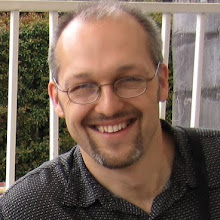Michael Shermer is right--we can't fall into the trap of
believing God's a cosmic lab rat who will respond to our stimulus
(prayer) by doing the task we set for him. (See my previous post--"Scientific Prayer?" of July 9).
Yet, having been trained as a mathematician and scientist in college,
I like the scientific method and I think it can be useful in learning
about the unseen reality--and how it interacts with seen reality.
Dennis Ortega urged a group of us to practice "trial and error
prayer." Pray for many things, and pay attention to what kinds of
prayers God answers and doesn't answer. For over ten years now I have
tried, on my better days, to do that.
One thing I've found is that God does NOT answer prayers to change
someone's will.
I have had many friends pray--indeed, I myself have often prayed--for
someone to stop behaving in a certain way, or make a certain
decision, or the like. Somehow, that never seems to be answered, at
least not directly.
And as I reflect, I realize God has never thwarted my will, either.
Even when I beg and plead that I would be stopped from doing a
certain action--I never am. Have you noticed that? God won't make you
do anything.
What I notice, however, is that God will gladly arrange circumstances
and provide resources so that if I choose to use them, I can take
"the way of escape" from the situation where I would be likely to do
what I don't want to do.
Similarly, I conclude, God will bring individuals, knowledge, and
circumstances in front of someone I am praying for to enable them to
make a certain decision if they want to.
God respects the sanctity of our own will so much as to make it
inviolable. Perhaps that is fundamental to being human. We can never
thwart God's will, and God will never thwart our will.
Viktor Frankl, the psychologist interned in the Nazi concentration
camps, observed that even in those most vile circumstances there was
still room for the human will to operate. Corrie Ten Boom made a
similar observation: Those who chose to forgive their tormentors and
be thankful for what they did have, escaped insanity that plagued so
many "survivors"--people who lived to tell about their experience,
but psychological and spiritually were enslaved and destroyed by the
experience.
So back to prayer and unseen reality. If I'm right, this law holds at
least as true as the law of gravity: Prayers for people's
circumstances and situations may be answered, even physical healing,
but prayers to change someone's will and choices are fundamentally unanswerable.
What do you think?

1 comment:
Interesting. I think I agree.
There have been times in my life where it has felt that I have "given my will" to something or someone else. These times usually turn into downward spirals. I would pray that God would "change my will" but ultimately, I am going to do what I really want to do (which is what I don't want to do), especially if I feel like I have already given up my will.
I don't think we can ever fully surrender our will to something. It may feel that way sometimes (for good or for bad) and we will probably put the blame on other things ("the woman gave me the fruit") for "controlling" our will. But I think whether we admit it or not, we will follow the path that we really want to follow. Our wills will take us in that direction.
So maybe the circumstances that God can (and certainly does!) control actually influence what we really want, which in turn, our wills will follow.
This seems to connect to what you posted a little more recently with Dallas Willard's quote, "God wants you to become the kind of person whom he can trust to do whatever you want." Our wills follow what we really want which eventually becomes just what God wants. And we have the character to handle with integrity the power and gifts that God so abundantly wants to give us...to use as we will.
[I guess I entered this discussion a little late but I am excited to be able to read/think/discuss more on your theoblog!]
Post a Comment